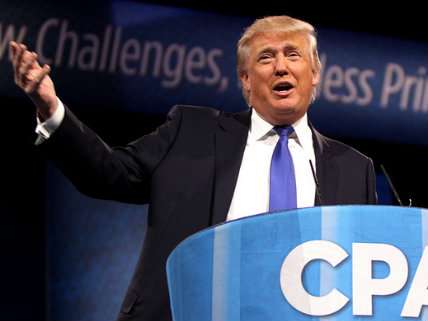Paul Ryan's Refusal to Criticize Donald Trump By Name Gives Trump a Pass
The House Speaker's speech on the state of American politics made no direct mention of the GOP frontrunner.

When Speaker of the House Paul Ryan announced that he'd be delivering a speech today on "the state of American politics," many assumed that he'd be making a statement in opposition to Donald Trump, the current frontrunner for the Republican party's presidential nomination.
The remarks would come just days after New York Times columnist Ross Douthat sharply criticized Ryan's response to the Trump campaign so far, saying that "faced with a potentially-existential threat to his vision of conservatism (not to mention his House majority), Ryan's answer is first, change nothing; second, do nothing."
The framing of the announcement raised expectations that Ryan, who has made several speeches indirectly criticizing Trumpish behavior but has also indicated that he would back the candidate if he became the party's presidential nominee, might finally address Trump directly. Which, of course, would be a big deal given that Ryan is, in addition to being the Speaker of the House, arguably the institutional voice of the party right now, its chief spokesperson and visionary.
But Ryan did no such thing. He didn't mention Trump by name at all, and he didn't raise many of the biggest concerns people have about Trump and his campaign. Instead, he waxed nostalgic about his political mentor, Jack Kemp and issued a nonspecific call for greater civility in politics. Trump's campaign loomed over the speech, but Ryan seemed determine not to take it on in anyway—even indirectly. If anything, Ryan's speech today offered even less in the way of resistance to Trump and his ideas than previous remarks.
Earlier this month, following Trump's initial refusal to disavow the support of the Ku Klux Klan and white supremacist leader David Duke, Ryan gave a forceful speech in which he said that he'd call out objectionable behavior when he saw it.
"When I see something that runs counter to who we are as a party and as a country," he said, "I will speak up. So today I want to be very clear about something. If a person wants to be the nominee of the Republican Party, there can be no evasion and no games. They must reject any group or cause that is built on bigotry. This party does not prey on people's prejudices. We appeal to their highest ideals. This is the party of Lincoln."
That's an admirable sentiment, and it's clear enough who and what it's directed at. But then, as today, Ryan didn't atually name Trump, choosing to criticize Trump-like behavior generally rather than go after Trump himself. And when asked whether he'd support Trump as the nominee, Ryan said yes. In follow ups, he's stuck with that line, saying that he has to "respect the primary voter."
Here's what that ends Trump's campaign rallies have become increasingly marked by physical unrest, and Trump has rationalized violence committed by his supporters, saying it's "appropriate" and that "we need more of it." He has on multiple occasions suggested he might pay the legal bills for supporters who commit violence at his rallies, and then lied and claimed he never did. He's said he believes that a brokered Republican convention this summer would result in riots. He's also issued gone after his rival Ted Cruz's wife, issuing a vague threat to "spill the beans" on her after accusing Cruz of backing an ad that was produced by an outside anti-Trump group.
And, at the same time, Trump has continued to blatantly lie about everything from his own business record to the state of the economy to his own half-baked policy positions, while proving that he has neither the temperament nor the basic knowledge that required to be president. In practice, supporting the nominee if it's Trump means potentially supporting all of the above.
Yet in his speech today, Ryan barely touched on any of this. He called for a kinder, gentler tone in politics, said that debate was preferable to disorder, and urged politicians to be more specific in their policy proposals. But he didn't mention Trump's rallies, or his ostentatious fabrications, or his campaign's telling mix of petty personal bullying and authoritarian bluster. Instead, Ryan gently called for everyone to generally be nicer and more upbeat and a little more specific about policy. He described the world he'd like to see, rather than attempting to grapple with the world that exists
That's fine, I suppose, but it does little to meaningfully address the Trump-poisoned state of American politics, or of Ryan's own party. And in combination with its overt Kemp-nostalgia, it suggests that Ryan, and much of the party he represents, will continue to, well, do nothing and change nothing in response to Trump's campaign.
The only other way to interpret Ryan's speech today is that he sees nothing from Trump that, to borrow Ryan's own words, runs counter to the character of the Republican party or the nation, that he believes Trump has done nothing that merits speaking up about specifically and directly, by name, with no evasion and no games. I don't believe that's the case, but if it is, then that reveals more about the state of American politics today than anything Ryan actually said.
Regardless, Ryan's speech today constituted a kind of tacit acceptance of the GOP frontrunner's campaign, which it ultimately serves to enable. And in doing so, Ryan is, at least inadvertently, rapidly paving the way for the party of Lincoln to become the party of Trump.


Show Comments (70)